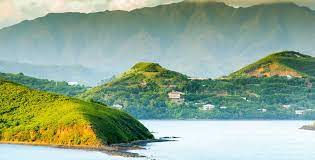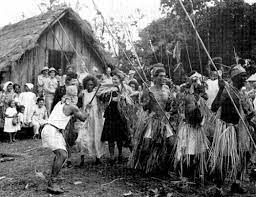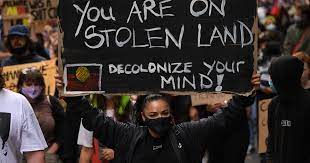A SHORT HISTORY OF NEW CALEDONIA - LEON MAULIN - FRANCE
- makfor9
- 21 nov 2021
- Tempo di lettura: 4 min
New Caledonia was originally populated by the Kakanks who remain the native population of the islands. The Kanaks arrived 3000 thousand years ago from the South-East of Asia. Split among a huge number of clans the island separated itself from the rest of the Melanesians world and the Kanak languages became numerous 28 or 32 depending on various estimates. The island was first approached In 1774 by The English explorer James Cook who for its choppy waters and its rugged coast named it after the coast of Scotland otherwise known as Caledonia. Miscellaneous English Missionary societies tried to settle on the archipelago. But it was the French who, seeking for a piece of land in the southern seas, took greater interest in the Destiny of New Caledonia. The french explorer Dumont d’Urville mapped first the irregular coast of the main island and it is in 1844 that a first french garrison established itself on the coast claiming the island. In 1854 Napoleon III extended to settle prisoners in the island therefore imitating the policy of the English Government toward Australia. The Creations of far away prisons known as the “bagne” had the upside of removing political agitators far from the national territory and at the same time ensuring that the newly discovered territory would remain part of the French possessions in what was at the time a race for trade routes. As in Australia the native populations of the archipelago quickly became strongly opposed to the French administration who deprived them of their land. After having finished their sentences most prisoners would not be offered the possibility to return to France and settle in the native’s territory. What was at first a seemingly peaceful cooperation quickly became a strong opposition between native and the French administrations supporting the new settlers. In 1878 the first great rebellion of natives led by the Tribal chieftain Atai was repressed and the Head of the Natives leader was contrary to every Kanak custom departed from it’s body and sent to a Museum in Europe. Slowly the indigenous lands entered French possession. Conflicts arose from the definition of possession of the Land, for the French having bought the land meant sovereignty on those territories whereas the Kakaks claimed this was merely a right of temporary occupation. Other conflicts arose from the “unoccupied lands' ' which were inhabited by the Kanaks because of their religious or sacred statute for the Kanaks but on which the French settled and made their cattle grazed. In 1881 according to the French republic indIgenous Code the Kanaks natives were given the statute of French Subject but not the french Citizenship at the same time the Prisoners were closed and replaced by an only Growing exploitation of New Caledonia main Ore resources Nickel “ the white Gold”. In 1882 John Higginson created the main company for the excavation of Nickel on the Island, mainly using native workforce.
One of the goals of the French administration was to create an Indegenous elite designed to be an intermediary between the administration itself and the native living in the tribal areas. At the same time the mixing of the natives and the European states resulted in the creation of a bicultural society in New Caledonia cities, known as the “Caldoche ''. After the second world war the indegenous code disappeared and the entirety of new Caledonia became a part of the french republic. Whereas most of the former French colonies became independent, New Caledonia remained part of the French territories. This was not without strong protests from a part of the local population both Caldoche and native. Among workers unions led by the French politician Lenormand supported the idea of political autonomy but swiftly more radical elements led the Struggle toward the goal of independence from France. In the 1960’s France went through the process of the Algerian independence warfare and in the 1970’s through the independence of The comoros islands through a referendum.
The social and economic disparities resulted in the transformation of the main new Caledonia political party, The Caledonian Union from an autonomist party to being independentist and therefore led by its famous leader Jean Marie Tijbao.
The Caledonian “Troubles” from 1984 to 1988
From 1984 to 1988 New Caledonia went through a near Civil and ethnic war period which resulted in several deaths. In the midst of the political field most of the independence parties were mustered by the Caledonian Union in forming the independent front.
Both the anti independence and the pro independence radicalized and the political situation in the island shared striking similarities with the “troubles' ' in ireland at the same time. In 1984 a curfew was issued in Noumea when 10 partisans of the independence were killed in an ambush. The Kanaks separatists replied with creating an army designed to insure the completion of independence and it was not long before this newly designed para-military force named the “Front de liberation Kanak”, launched attacks on civilians and loyalist paramilitaries. Several attacks were also launched against police stations and the French military including bombing, shooting and ambush. This dire situation lasted 4 years culminating in the famous episode of the Ouvea cavern were 24 hostages, mainly police officers” were liberated by the french special forces in a deadly assault resulting in the death of 21 people. In 1988 the Mantignon agreement was reached, a long period of talk between the French government and the independents followed and was issued in the Noumea agreement of 1998. New Caledonia benefited from a special statute making the french republic nearly a federal state.The most central part of the agreement was the holding of three referendums to which could only partake those living in the island before 1998. Whereas the dispositions of the referendums are favoring the kanak part of the island the first two referendums of 2018 and 2020 ruled that the majority of the population able to take part in the voting process wanted to remain in the french republic, but the majority of the kanak population lean toward independence.





Commenti